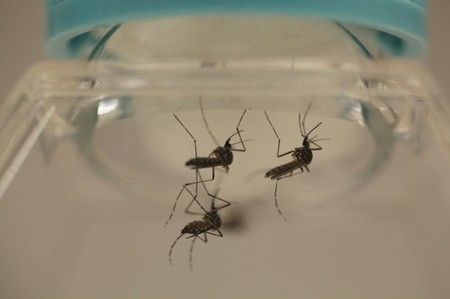Advertisement
Florida cases seen as first sign Zika transmitted locally in U.S

By Barbara Liston and Zachary Fagenson
ORLANDO, Fla./MIAMI (Reuters) – Florida authorities on Friday reported the first sign of local Zika transmission in the continental United States, concluding that mosquitoes likely infected four people with the virus that can cause a rare but serious birth defect.
Governor Rick Scott said the state believed active transmission of the virus was occurring within an area of Miami about the size of a square mile (2.6 square kms). Testing showed that one woman and three men had been infected, Scott said.
While health officials have yet to identify mosquitoes carrying the virus, the state has ruled out other means of transmission, including travel to another country with a Zika outbreak, and sexual contact.
“This means Florida has become the first state in the nation to have local transmission of the Zika virus,” Scott said at a press conference.
Zika appears to pose the greatest risk when it infects pregnant women, given its ability to cause microcephaly in babies, a condition defined by small head size that can lead to developmental problems. The current outbreak was first detected in Brazil last year and has since spread rapidly through the Americas.
Florida Surgeon General Celeste Philip said that health officials are not advising pregnant women to move out of the suspected transmission area.
“We do not believe there will be ongoing transmission,” Philip said at a press conference in Orlando, citing daily efforts to control the mosquito population in the area.
The local health department is searching for other potential infections, with more than 2,300 people tested so far in the state, is ramping up mosquito control programs and is distributing Zika protection kits to pregnant women at their doctors’ offices, Florida officials said.
Federal authorities have already begun to treat the Florida cases as a sign of local transmission. On Wednesday, the U.S. Food and Drug Administration ordered blood banks in Florida’s densely populated Miami-Dade County and Broward County to stop collecting blood until they can test each unit or incorporate technologies that can kill blood pathogens.
Residents in the trendy Miami neighborhood thought to harbor Zika said the local spread of the virus had been inevitable, given the large numbers of tourists from other countries with outbreaks.
Damian Jose Delgado, a 35-year-old father of two, said news of Zika’s arrival would make him think twice about expanding his family.
“I think I might be done having kids,” Delgado said.
EARLY WARNINGS
U.S. health officials have cautioned for months that the summer mosquito season was likely to bring local outbreaks, with Gulf Coast states such as Florida, Texas and Louisiana on the frontlines. They expect Zika’s spread will be more limited than in Brazil, given widespread U.S. use of screens on windows, air conditioning and mosquito control programs.
“As we anticipated, Zika is now here,” Tom Frieden, director of the U.S. Centers for Disease Control and Prevention, said during a conference call on Friday.
“There may be occasional clusters” of mosquito-borne transmission in the continental United States, he said, but little likelihood of widespread transmission.
Frieden said the agency was not recommending that people, including pregnant women, limit travel to Florida, including the neighborhood where people may have been infected. He said CDC would reassess that advice if there is evidence of Zika spreading rapidly in the area.
The agency has told pregnant women to avoid travel to more than 50 other countries and territories where Zika is active.
Up to 80 percent of people infected with Zika may experience no signs of illness, while those who do generally have relatively mild symptoms, including fever and rash. There are no specific treatments or vaccines for the virus.
The World Health Organization declared a global health emergency in February, reflecting alarm over the discovery that Zika was linked to microcephaly and other severe neurological abnormalities. Brazil has confirmed over 1,700 cases of microcephaly linked to Zika infection in pregnant women.
Public health officials say Zika is also a likely cause of Guillain-Barre syndrome, a rare neurological disorder in adults that can cause temporary paralysis.
Zika’s arrival in the United States comes with Congress in recess after failing to reach agreement over how much funding could be used to fight an outbreak. The Obama administration has requested $1.9 billion to finance research, mosquito control and other prevention efforts. Scott said he has authorized $26.2 million to help fight the virus in the state.
President Barack Obama has been briefed on the Florida Zika cases and has directed his team to ensure the state has the support it needs to fight the virus, a White House spokesman said. The new findings should be a “wake-up call” to Congress to provide more funding, spokesman Eric Schultz said.
Until now, the more than 1,600 Zika cases in the United States have stemmed from travel to another country with active transmission, as well as a small number of cases of apparent sexual transmission by a person infected outside of the country.
Puerto Rico has seen several thousand confirmed cases of local transmission. U.S. health officials have predicted there will be hundreds of thousands of cases on the island territory before the current outbreak ends due to the prevalence of Zika-carrying mosquitoes and a lack of infrastructure to protect against insect bites.
(Additional reporting by Ankur Banerjee in Bengaluru, Ayesha Rascoe in Washington and Ransdell Pierson in New York,; Writing by Michele Gershberg; Editing by Bernadette Baum, Paul Simao and Bernard Orr)











